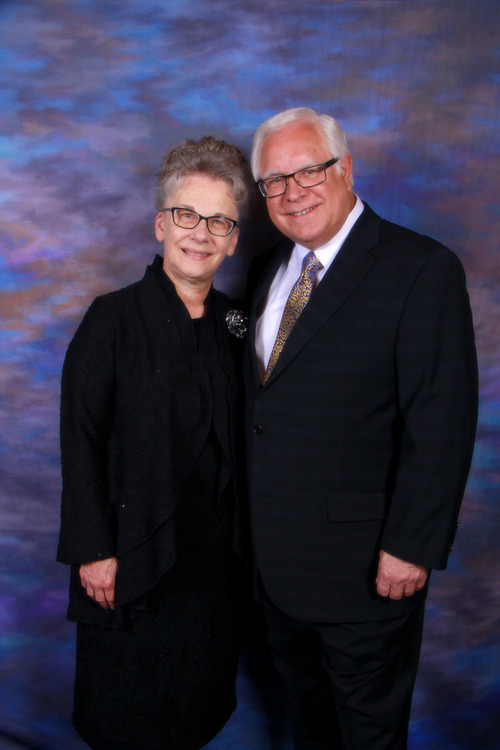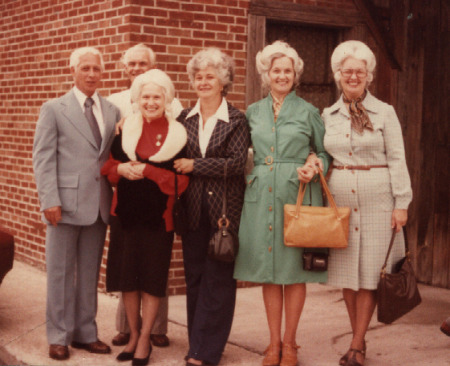 (This is the final segment of the chapter on “Your Relation Relationship” in the book “Hand in Hand: Deepening Your Relationship with Jesus Christ.” Target date for release is July 1, 2017.)
(This is the final segment of the chapter on “Your Relation Relationship” in the book “Hand in Hand: Deepening Your Relationship with Jesus Christ.” Target date for release is July 1, 2017.)
Training and Nurturing
First-time parents quickly find out that parenting is hard work. This epiphany goes way beyond feeding, changing diapers or caring for a colicky kid. Those are the easy aspects of the job. Dealing with strong wills, rebellious attitudes, mood swings and impulsive behavior drive many parents to distraction. These tribulations convince many parents that they are failing in their assignments, but, usually things turn out good when the child becomes an adult.
The classic scripture for parenting is found in Proverbs 22:6. Train up a child in the way he should go, and when he is old he will not depart from it. The wise man’s admonition sets the parameters for child-rearing. “The way he should go” must not stem from the whim or fancy of a parent. It must be solidly based on scriptural principles that have stood the test of time. As parents maintain a strong relationship with Christ, they will develop parenting skills that work. From the infant stage to school-age, the mother and/or father provide the primary influence in a child’s life. While training and nurturing may be difficult, neglecting a child results in far greater pain when he or she grows up. Four important actions need to be analyzed.
Nurturing: Negotiating the stages of early childhood successfully requires sensitive, nurturing care that build capacities for trust, empathy, and compassion. Experts in early childhood tell us that supportive, warm, nurturing emotional interactions with infants and young children are vital to the appropriate growth of the central nervous system. When babies hear the human voice, for example, they learn to distinguish sounds and develop language. Watching adults gesture and make facial expressions help babies learn to perceive and respond to emotional cues and form a sense of self.
Teaching: Non-academic teaching operates in a different context than the school environment. At home, parents do not enjoy formal positional leverage. Instead, they must impart knowledge or skills that children either lack or do not know how to use. Children only learn when they are convinced that the parent knows what he or she is teaching. The lazy, unfocused parent who presumes on “because I said so” authority will fail. Also, remember that teaching is more than a process; it must involve right content. What you teach is more important than how you teach.
Coaching: Parents need to wear the coaches’ hat. All coaching involves teaching, but the main job for coaches is to motivate players. Coaches must get closer to the human side of those with whom they work in order to effectively guide them to the highest levels of capability. Coaches work to correct errors in performance, or they see lapses in effort and inspire players to generate more intensity. Coaches get a feel for bad attitudes and target them for change. These observations require empathy, sensitivity and understanding. They also demand an inner strength that overcomes players’ natural resistance to conform. Probably, the most rewarding and enjoyable aspect of parenting is coaching.
Training: Parents who dedicate themselves to training stand to gain the most mileage from their efforts. It takes a huge amount of dedication, because few proactive tasks of parenting demand more work, cause more grief or catch more flak than training. As trainers, parents hear all the bitter complaints. They get up early, put in long hours and go to bed exhausted. It is hard to make children do what they don’t want to do, or talk them into painful exercises and deprive them of fun. Trainers, however. understand the exponential gains that rigorous training eventually yields. Tough, and sometimes mean and unsympathetic, the parent/trainer exchanges the pleasures of the moment for the joys of a lifetime.
Without these elements, parenting fails. But, when mothers and fathers learn how to nurture, teach, coach and train, they help their children live better lives.
Dysfunctionalism and Abuse
The traditional family system consists of mother, father and children working together in a secure, functioning environment, with well-understood roles, responsibilities and boundaries, all experiencing the bond of deep love and care for each other. Traditions, expectations, morals, beliefs, customs and actual differential behaviors impact the family in many ways. A dysfunctional family results from the loss or distortion of one or more of these elements. When this happens, the working order of the family not only breaks down, individual members may suffer profound personal disorders.
The dysfunctional family typically exhibits the following traits: Continual conflict, abusive actions accepted as normal, family heads under-function, minimal boundaries and guidance, neglected children fend for themselves, minimal training, inconsistent and inappropriate behavior (cursing, violence, disrespect). Family members most likely have deep, personal unresolved problems. These dysfunctions exist because the family spends little or no quality time together and there is little or no interest in the lives of other family members. The problems are further exacerbated by high demand but low yield, high levels of stress and tension, extreme negativity and hostility, the problem/symptom cycle continues without resolution, no meaningful communication, and roles by significant people are inappropriately vacated or reversed. One woman who was raised in a dysfunctional family said, “You know that you are in a dysfunctional family if you know that you cannot talk to your parents about how you feel without fearing that your feelings will be laughed at, or will bring you more emotional and/or physical harm rather than a rational, listening, and loving heart.”
Perhaps the most disturbing profile of dysfunctional families is the widespread incidence of child abuse. All of us have heard heartbreaking reports of abuse, mistreatment, child endangerment and death of children in our own communities, even among safe or upscale neighborhoods.
“Child maltreatment can cause serious physical injuries and even death. Children who are abused or neglected, including those who witness domestic violence, also are more likely to experience cognitive, emotional, and behavioral problems, such as anxiety, depression, substance abuse, delinquency, difficulty in school, and early sexual activity. In addition, child maltreatment can disrupt brain and physical development, particularly when experienced in early childhood, increasing the risk for health problems in adulthood, e.g., heart disease, cancer, obesity, depression, and suicide, among others. Children who are abused or neglected also are more likely to repeat the cycle of violence by entering into violent relationships as teens and adults or by abusing their own children.” www.kidsdata.org.
When mothers and/or fathers fail to form healthy relationships between themselves and other family members, they breed frustration and anger, which, in turn, find outlets in abusive behavior. Sometimes, parents cover up their extreme actions by claiming to exercise discipline, but the underlying cause is their own personal problems. Discipline is never something a parent does to a child; it must be what a parent does for a child.
Developmental Psychologists, Bianca Mgbemere and Rachel Telles say that there are four general types of parents: 1) Permissive, 2) Neglectful, 3) Authoritarian, and 4) Authoritative. Of the four types, they posit that the neglectful parent is the most harmful because of the disinterest that he or she exhibits toward the child. Coming in a close second is the authoritarian parent who is long on discipline but short on love. (myvanderbilt.edu).
Of course, the Bible does allow for strict discipline and even corporeal punishment. But, Christian parents must realize that love and wisdom regulate discipline, and that no disciplinary action should induce suffering of any kind. Fathers, do not provoke your children, lest they become discouraged. Colossians 3:21. This scripture in the New International Version reads, “Fathers, do not embitter your children …” Unless the Holy Spirit governs the parenting process, the human spirit can dominate and permanently scar the child. When discipline is applied wisely and sparingly, parents avoid abusing their children. Thus, parents must operate out of their own right relationship with Christ.
Extended Family Obligations
The family system involves more than the nuclear family. The extended family includes grandparents, aunts, uncles, cousins and in-laws, and sometimes those affectionately known as “shirttail relation” (or not!) The closer knitted that an extended family is, the more each member feels an obligation to respect and support each other. These ties carry with them a strong sense of honor, loyalty and a spirit of kinship. Often, a patriarch or matriarch sits atop the entire structure, using whatever influence he or she has to shape opinions, make decisions and exert control over the entire family. Those who resist that control and chart their own course contrary to family traditions are called the “black sheep” of the family.
With the advance of DNA technology, the interest in discovering one’s genealogical background has become increasingly popular. People have an innate curiosity to find out where they came from, what their ethnicity is and who their relatives may be. This quest represents a universal desire to be a part of something bigger than oneself, to attach significance to their lives that may have never been known or understood. Some years ago, I journeyed to the Arcadia region of Greece, in the central part of the Peloponnese, to the village of Mabria, not far from Megalopolis, where my grandfather was born and raised. He immigrated to America at the age of sixteen. Afterwards, I wrote about my experience:
“Like a long lost friend, my past rose from these grounds to meet me. In touching it, I was assured of the spiritual bond, the sense and substance of belongingness that defines my essence. I am a link in a chain, a part of a whole, one element that derives its meaning from the rest, and awed by a glorious synergism of people and culture. Mabria taught me the sacredness of family. I grieve for millions today who have no linkage to history, not even to one generation before them. With no sense of the past, will they have a sense of the future? If they do not know where they came from, will they not care where they are going either? The family is sacred, yes. All families are. But the overarching lesson is that life is spiritual. Materialism, secularism, living for self and pleasure, are all vapid and unfulfilling in the end.” www.jonathanjordan.squarespace.com
The Bible sets the standard for togetherness for the extended family. The Jews kept meticulous records of lineages and generations. Each Hebrew child born knew exactly who he or she was in terms of family ties. This practice contributed immeasurably to personal identity and an understanding of family traits. It also engendered a sense of commitment to family members and preserved a culture of protection and value. Each member adds value and meaning to the rest. Stories, historical facts, traditions and even heirlooms can be handed down from one generation to another. Also, family identity makes it much more likely that grievances can be worked out and conflicts can be resolved. Long ago, the world concluded that history was vital to understanding ourselves and our culture. Keeping the extended family ties alive ensures that each of us has a personal link to that history.
Christ’s Greater Family
Jesus did not limit his extended family to blood relatives. He intended for the church to expand its filial horizons to the world of believers. While He was still talking to the multitudes, behold, His mother and brothers stood outside, seeking to speak with Him. Then one said to Him, “Look, Your mother and Your brothers are standing outside, seeking to speak with You.” But He answered and said to the one who told Him, “Who is My mother and who are My brothers?” And He stretched out His hand toward His disciples and said, “Here are My mother and My brothers! For whoever does the will of My Father in heaven is My brother and sister and mother.” Matthew 12:46-50. Christians consider the members of the body of Christ as brothers and sisters, and, accordingly, we give them the same spiritual standing in our lives as we do to those who are naturally related to us.
This sentiment transcended further to the concept of neighbors. In his exchange with the rich, young ruler, Jesus told the parable of the Good Samaritan. But he, wanting to justify himself, said to Jesus, “And who is my neighbor?” Then Jesus answered and said: “A certain man went down from Jerusalem to Jericho, and fell among thieves, who stripped him of his clothing, wounded him, and departed, leaving him half dead. Now by chance a certain priest came down that road. And when he saw him, he passed by on the other side. Likewise a Levite, when he arrived at the place, came and looked, and passed by on the other side. But a certain Samaritan, as he journeyed, came where he was. And when he saw him, he had compassion. So he went to him and bandaged his wounds, pouring on oil and wine; and he set him on his own animal, brought him to an inn, and took care of him. On the next day, when he departed, he took out two denarii, gave them to the innkeeper, and said to him, ‘Take care of him; and whatever more you spend, when I come again, I will repay you.’ So which of these three do you think was neighbor to him who fell among the thieves?” And he said, “He who showed mercy on him.” Then Jesus said to him, “Go and do likewise.” Luke 10:29-37.
The impact of the “greater family” teaching informs the vision of the church. We do not view the world with hostility or ill intent. Our relationship with Jesus Christ leads us to treat everyone with love, without regard for race, gender or nationality. We share Christ’s compassion for all lost souls, and as His ambassadors, we embrace the ministry of reconciliation. Now all things are of God, who has reconciled us to Himself through Jesus Christ, and has given us the ministry of reconciliation, that is, that God was in Christ reconciling the world to Himself, not imputing their trespasses to them, and has committed to us the word of reconciliation. Now then, we are ambassadors for Christ, as though God were pleading through us: we implore you on Christ’s behalf, be reconciled to God. 2 Corinthians 5:18-20.
 Sunday, May 7, 2017 at 02:14PM
Sunday, May 7, 2017 at 02:14PM  This past week, I concluded twenty-two years of service as the Ohio District Superintendent. Our UPCI manual states that an elected official can serve for eight years if he receives a simple majority of the vote, but after that he must get a two-thirds majority to be returned to office. That happened every election cycle from 2003 to 2015, an incredible gesture on the part of the district voting constituency for which I always felt greatly honored. Now, in 2017, we have elected a new leader who will, I’m positive, do a superb job in taking the district to an ever-brighter future.
This past week, I concluded twenty-two years of service as the Ohio District Superintendent. Our UPCI manual states that an elected official can serve for eight years if he receives a simple majority of the vote, but after that he must get a two-thirds majority to be returned to office. That happened every election cycle from 2003 to 2015, an incredible gesture on the part of the district voting constituency for which I always felt greatly honored. Now, in 2017, we have elected a new leader who will, I’m positive, do a superb job in taking the district to an ever-brighter future.






